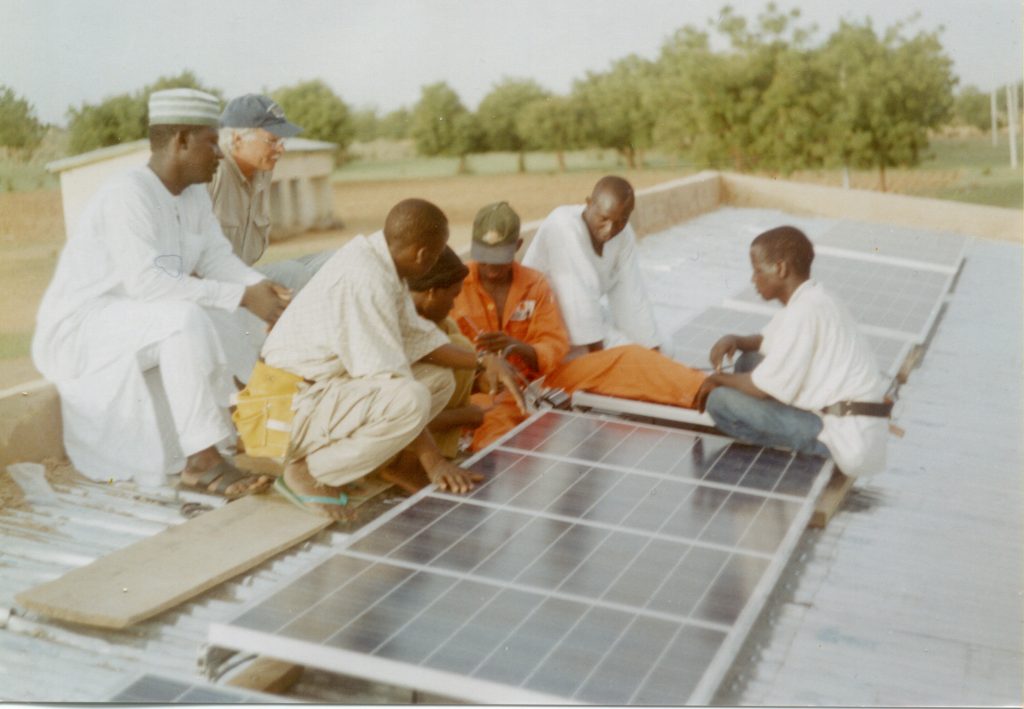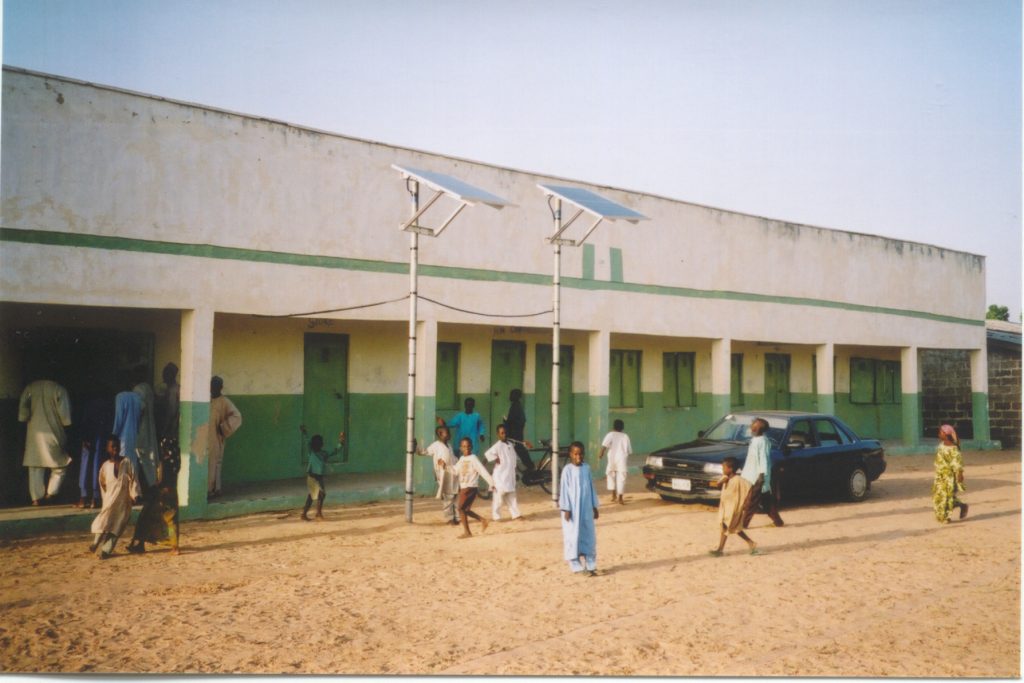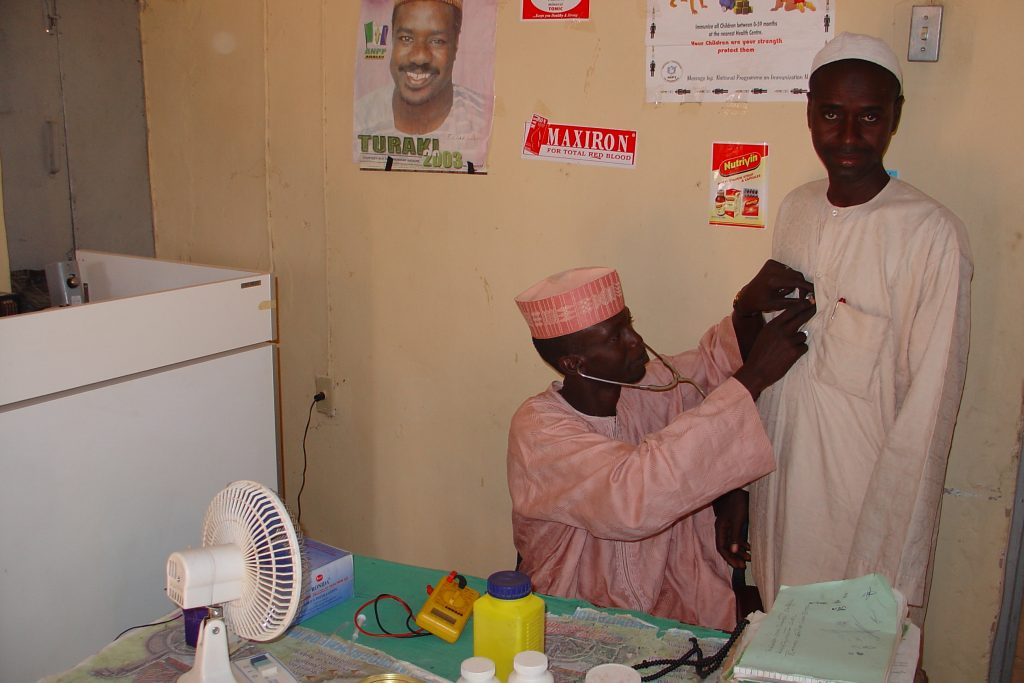Launching SELF’s Whole Village Model in Jigawa State
SELF installed a solar system in Jigawa State that demonstrated the comprehensive use of solar-generated electricity in a village setting to improve education, water supply, health, agriculture, commerce, security, and women’s opportunities. The comprehensive application of solar electricity in these villages was intended to bring profound changes in education, health, and commerce while easing the burdens of living in a harsh environment.

In the desert grasslands of northern Nigeria, the living conditions in rural villages has remained constant for centuries. For most villages, the quality of drinking water is questionable—being retrieved from an open well or by hand pump. Oftentimes women must walk miles to reach the nearest water source.
In contrast to the major cities and towns in the state, rural villages have seen very little electrification, and where it exists is often unreliable. As a result, the rural areas of northern Nigeria lack the resources needed to improve health, education, and commercial development. Public education is not free; it is limited, as are opportunities for employment.
In 2001, discussions began between SELF Executive Director Robert Freling and Jigawa State Governor Ibrahim Siminu Turaki in regard to the installation of a PV system in the rural villages of Jigawa State. As project plans developed, 60% of the funding commitments were obtained from the United States Agency for International Development and the United States Department of Energy, leaving the remaining balance to be funded by the local government. SELF decided to implement this project, in partnership with the Jigawa Alternative Energy Fund (JAEF) in three Jigawa villages, where over 7,500 people would benefit from its tangible results.
The implementation of this project had several priorities that included a reliable water supply; the electrification of medical clinics, centers of worship, and primary schools; and the installation of streetlights. The top priority was securing a reliable and safe source of drinking water. Jigawa State has few rivers and limited access to water on the surface of the land. The traditional methods of retrieving water ranged from open wells with a bucket attached to a rope, to hand pumps, to government-supplied diesel-powered pumps that are run until they break down or become too expensive to fuel. The solar-powered water pumps supplied for this project were designed to run maintenance-free for eight to 10 years. They are currently supplying the villages with clean, fresh water from deep wells. The new wells are tied into a village distribution system with numerous taps, which has reduced the time spent by villagers to retrieve drinking water for their families.
With the use of solar PV, village primary schools now have at least two illuminated classrooms that are also utilized for adult education classes in the evenings. Each school has been provided with a computer as well, in hopes of connecting the villages to the internet via the state’s broadband system. This process has opened rural villages to the rest of the world in terms of healthcare, education, and commerce.
With village health clinics now benefiting from solar PV, medical professionals can see patients at night for the first time. The electricity also powers vaccine refrigerators, and increases the care and comfort level of staff and patients alike.


The implementation of streetlights has been one of the most valued PV systems by the village community members. Given the hot climate of Jigawa State, a great deal of business and socializing takes place after sunset when it is considerably cooler. The streetlights give people bright areas in which to congregate and provide valued security for vulnerable members of the community at night.
The solar-powered micro-enterprise buildings are the project centerpieces of each village. Each center provides electricity to six small businesses that would otherwise not have access to electricity. The shared PV system is much less expensive than individual systems for each shop, which allows vendors to modernize their trade and increase productivity. For example, the primary source of income for the women of Wawan Rafi comes from the production and sale of peanut oil. Traditionally, small amounts of oil are made in a process that demands great amounts of time and strenuous labor. In the village of Wawan Rafi, SELF has incorporated a solar-powered oil expeller that will save time and labor, while also increasing the profits for these women.

SELF is a global leader in the fight against energy poverty. Since 1990, we’ve pioneered unique applications for solar energy, powering progress on food security, health care, education, gender equity, and more.
501(c)(3) non-profit organization
EIN: 52-1701564